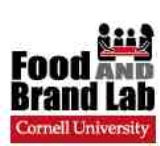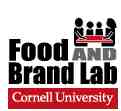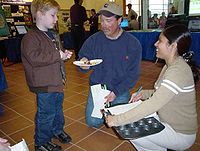
Food and Brand Lab
Encyclopedia

Cornell University
Cornell University is an Ivy League university located in Ithaca, New York, United States. It is a private land-grant university, receiving annual funding from the State of New York for certain educational missions...
which focuses on why people buy and eat the foods they do in the quantities they do. The stated mission of the Lab is to "Conduct top level academic research that enables consumers to use food to help them 'to be what they want to be' -- this could involve eating less, eating better, or enjoying food more." By focusing on behavior
Behavior
Behavior or behaviour refers to the actions and mannerisms made by organisms, systems, or artificial entities in conjunction with its environment, which includes the other systems or organisms around as well as the physical environment...
al and psychological explanations as to why people overeat and why they have the food preferences they have, the Lab aims at helping individuals and health care providers change food-related behaviors and improve health. The Lab is the main force behind the Small Plate Movement, which is encouraging consumers to use smaller dinner plates in their homes and is encouraging restaurants to use smaller plates in their restaurants.
The findings of the lab are widely published in medical, marketing, nutrition, and psychology journals. They have also been summarized in the best-selling book Mindless Eating: Why We Eat More Than We Think (2006) and in Marketing Nutrition
Marketing Nutrition
Marketing Nutrition is a book that examines the intersection of consumer psychology, nutrition, and business and which is written by Cornell professor and current Executive Director of the U.S. Department of Agriculture's Center for Nutrition Policy and Promotion, Brian Wansink...
(2005), and they have been widely reported in the popular press.
History
The Food and Brand Lab -- originally known as the "Brand Lab" -- was first established by Brian WansinkBrian Wansink
Brian Wansink is an American professor in the fields of consumer behavior and nutritional science. He is a former Executive Director of the USDA's Center for Nutrition Policy and Promotion ....
while he was a marketing professor at Dartmouth College
Dartmouth College
Dartmouth College is a private, Ivy League university in Hanover, New Hampshire, United States. The institution comprises a liberal arts college, Dartmouth Medical School, Thayer School of Engineering, and the Tuck School of Business, as well as 19 graduate programs in the arts and sciences...
(1990-1994) and focused on individual food choices. The Lab was then transferred to the Wharton School at the University of Pennsylvania
University of Pennsylvania
The University of Pennsylvania is a private, Ivy League university located in Philadelphia, Pennsylvania, United States. Penn is the fourth-oldest institution of higher education in the United States,Penn is the fourth-oldest using the founding dates claimed by each institution...
(1995-1997), where its findings began to be noticed by major media outlets. The Wall Street Journal helped raise the Lab’s profile when it reported the findings of a series of studies on how package size influences how much food people consume on its front page. The finding that large packages can lead consumers to eat an average of 23% more food than an unconstrained smaller package provided systematic empirical evidence as to how one's immediate environment can bias them to unknowingly overeating. As the first major article on how an implied portion size influences intake and calorie consumption, it helped launch the introduction of mini-size packaging, including the popular, premium-priced 100-calorie packs.
As the Lab began focusing more and more on consumer welfare and nutrition, Wansink moved the Lab to the University of Illinois at Urbana-Champaign
University of Illinois at Urbana-Champaign
The University of Illinois at Urbana–Champaign is a large public research-intensive university in the state of Illinois, United States. It is the flagship campus of the University of Illinois system...
, where he was hired as a joint professor of Nutritional Science, Marketing, and Agricultural and Consumer Science. At this time, the newly christened Food and Brand Lab was formally institutionalized, and it broadened its focus to study the environmental factors that unknowingly influenced what a person eats and how much they eat.
To better investigate the interdisciplinary nature of food intake, the Lab recruited researchers from psychology, food science, marketing, agricultural economics, and nutrition, and it broadened its international appeal by incorporating researchers from France, Germany, Korea, India and the Netherlands. At the same time, the Lab has been involved with a licensed research restaurant (the Spice Box), and enlisted the cooperation of grocery store chains to serve as test sites to study a wide range of grocery shopping behaviors.
In 2005, Wansink moved to Cornell University, and the Lab was newly constructed in the Department of Applied Economics and Management in the College of Agriculture and Life Sciences. The new Food and Brand Lab is composed of a multipurpose set of interlocking rooms equipped with one-way mirrors, hidden cameras, and hidden food scales built into tables. The Lab’s main research room can be altered to imitate a kitchen or dining room, and in this context, researchers can vary the factors they believe influence food intake and selection in a more naturalistic setting.

Consumer Education Foundation
The Consumer Education Foundation was formed to promote healthy eating, and to help people improve what they eat, how much they eat, and how much they enjoy food. Established as a charitable fund in 1999, it was awarded the status of a tax-deductible foundation in 2005 under its registered name,...
, the Food and Brand lab sponsors Consumer Camp on the campus of Cornell University on one of the first two weekends in April. This provides a full-day “hands-on” opportunity for people of all ages to learn how to improve what they eat, how much they eat, and how much they enjoy food.
Findings
Research from the Food and Brand Lab has been credited with improving the deeper scientific understanding of food as well as the discovery of some simple everyday insights:- A person will eat an average of 92% of any food they serve themselves.
- The average person makes over 250 decisions about food each day.
- The Nutritional Gatekeeper of a home influences an estimated 72% of all of the food their family eats.
- Because of visual illusions, people (even bartenders) pour 28% more liquid into a short wide glasses than tall ones.
- 50% of the snack foods bought in bulk are eaten within 6 days.

